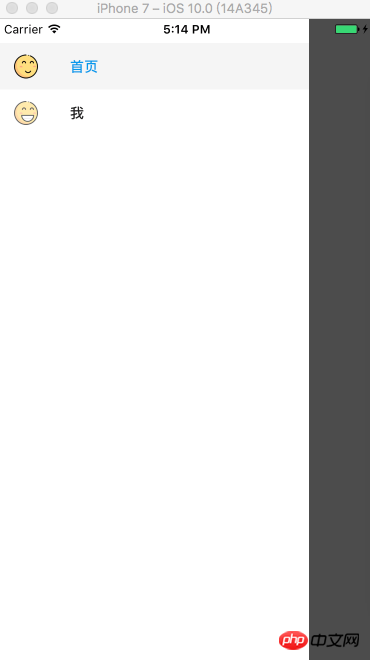本篇文章主要介紹了React Native react-navigation 導航使用詳解,詳解的介紹了react-navigation導航的使用,具有一定的參考價值,有興趣的可以了解一下
#一、開源程式庫介紹
今年1月份,新開源的react-natvigation庫備受矚目。在短短不到3個月的時間,github上星數已達4000 。 Fb建議使用函式庫,並且在React Native目前最新版本0.44中刪除Navigator。 react-navigation據稱有原生般的性能體驗效果。可能會成為未來React Native導航組件的主流軍。本篇內容基於【 ^1.0.0-beta.9 】版本來介紹關於該庫的使用和實戰技巧。可以看到,雖然是beta版本,不過基本上穩定,大家可放心在專案中使用。奉上 react-navigation 官方文件
該函式庫包含三類元件:
(1)StackNavigator:用來跳頁和傳遞參數
(2)TabNavigator:類似底部導航欄,用來在同一螢幕下切換不同介面
(3)DrawerNavigator:側滑選單導航欄,用於輕鬆設定帶抽屜導航的螢幕
二、react-navigation使用
具體內容大致分為如下:
(1)react-navigation函式庫屬性介紹
(2)StackNavigator、 TabNavigator實現介面間跳轉,Tab切換
(3)StackNavigator介面間跳轉、傳值、取值
(4)DrawerNavigator實作抽屜導航選單
(5)DrawerNavigator擴充功能
( 6)自訂react-navigation
1、StackNavigator屬性介紹
navigationOptions:設定StackNavigator的一些屬性。
title:標題,如果設定了這個導覽列和標籤列的title就會變成一樣的,不建議使用
screen:滑動過程中,整個頁面都會返回
none:無動畫
#onTransitionEnd:轉換動畫完成,將被呼叫的功能
############################## ##path:路由中設定的路徑的覆寫映射設定 ######initialRouteName:設定預設的頁面元件,必須是上面已註冊的頁面元件 ######initialRouteParams:初始路由參數 #### ##註:大家可能對於path不太理解。 path屬性適用於其他app或瀏覽器使用url開啟本app並進入指定頁面。 path屬性用來宣告一個介面路徑,例如:【/pages/Home】。此時我們可以在手機瀏覽器中輸入:app名稱://pages/Home來啟動該App,並進入Home介面。 #########2、TabNavigator屬性介紹#########screen:和導航的功能是一樣的,對應介面名稱,可以在其他頁面透過這個screen傳值和跳轉。 ######navigationOptions:設定TabNavigator的一些屬性 ######title:標題,會同時設定導覽條和標籤列的title ######tabBarVisible:是否隱藏標籤列。預設不隱藏(true) ###tabBarIcon:設定標籤列的圖示。需要為每個都設定
tabBarLabel:設定標籤欄的title。建議
導覽列設定
tabBarPosition:設定tabbar的位置,iOS預設在底部,安卓預設在頂部。 (屬性值:'top','bottom')
swipeEnabled:是否允許在標籤之間進行滑動
animationEnabled:是否在變更標籤時顯示動畫
lazy :是否根據需要懶惰呈現標籤,而不是提前,意思是在app打開的時候將底部標籤欄全部加載,默認false,推薦為true
trueinitialRouteName: 設定預設的頁面元件
#backBehavior:按back 鍵是否跳到第一個Tab(首頁), none 為不跳轉
tabBarOptions:配置標籤列的一些屬性iOS屬性
activeTintColor:label和icon的前景色活躍狀態下
activeBackgroundColor:label和icon的背景色活躍狀態下
inactiveTintColor:label和icon的前景色不活躍狀態下
inactiveBackgroundor:label和icon的背景色不活躍狀態下
showLabel:是否顯示label,預設為開啟style:tabbar的樣式
labelStyle:label的樣式安卓屬性
activeTintColor:label和icon的前景色活躍狀態下
inactiveTintColor:label和icon的前景色不活躍狀態下
showIcon:是否顯示圖標,預設為
showLabel:是否顯示label,預設開啟style:tabbar的樣式
labelStyle:label的樣式upperCaseLabel:是否讓標籤大寫,預設為true
pressColor:material漣漪效果的顏色(安卓版本需要大於5.0)
pressOpacity:按壓標籤的透明度變化(安卓版本需要小於5.0)
scrollEnabled:是否啟用可捲動選項卡tabStyle:tab的樣式
indicatorStyle:標籤指示器的樣式物件(選項卡底部的行)。安卓底部會多出一條線,可以將height設為0來暫時解決這個問題
labelStyle:label的樣式
iconStyle:圖示樣式
3 、DrawerNavigator屬性介紹
DrawerNavigatorConfig
drawerWidth - 抽屜的寬度
drawerPosition - 選項為左或右右。預設為左側位置
contentComponent - 用於呈現抽屜內容的元件,例如導航項目。接收抽屜的導航。預設為DrawerItems
contentOptions - 設定抽屜內容
initialRouteName - 初始路由的routeName
order - 定義抽屜項目順序的routeNames數組。
路徑 - 提供routeName到路徑配置的映射,它會覆寫routeConfigs中設定的路徑。
backBehavior - 後退按鈕是否會切換到初始路由?如果是,設定為initialRoute,否則為none。預設為initialRoute行為
DrawerItems的contentOptions屬性
activeTintColor - 活動標籤的標籤和圖示顏色
#activeBackground - 活動標籤標籤的背景顏色
inactiveTintColor - 非活動標籤的標籤和圖示顏色
inactiveBackgroundColor - 非活動標籤的背景顏色
內容部分的樣式樣式物件
labelStyle - 當您的標籤是字串時,要覆寫內容部分中的文字樣式的樣式物件 從上述中大致了解了react-navigation三種組件的一些基本屬性,所以到我們甩起袖子擼代碼見證下奇蹟了。
4、使用StackNavigator TabNavigator實作Tab介面切換、介面間導覽
##API定義:StackNavigator(RouteConfigs, StackNavigatorConfig)、TabNavigator(RouteConfigs, TabNavigatorConfig)
##(1)整合react-navigation:在終端執行【 npm install react-navigation --save 】(2)介面中匯入必要元件:import {StackNavigator,TabNavigator,TabBarBottom} from 'react-navigation';
import HomeScreen from './pages/HomePage';
import MineScreen from './pages/MinePage';const Tab = TabNavigator(
{
Home:{
screen:HomeScreen,
navigationOptions:({navigation}) => ({
tabBarLabel:'首页',
tabBarIcon:({focused,tintColor}) => (
<TabBarItem
tintColor={tintColor}
focused={focused}
normalImage={require('./imgs/nav_fav@2x.png')}
selectedImage={require('./imgs/nav_fav_actived@3x.png')}
/>
)
}),
},
Mine:{
screen:MineScreen,
navigationOptions:({navigation}) => ({
tabBarLabel:'我',
tabBarIcon:({focused,tintColor}) => (
<TabBarItem
tintColor={tintColor}
focused={focused}
normalImage={require('./imgs/tab_me_nor@3x.png')}
selectedImage={require('./imgs/tab_me_selected@2x.png')}
/>
)
}),
},
},
{
tabBarComponent:TabBarBottom,
tabBarPosition:'bottom',
swipeEnabled:false,
animationEnabled:false,
lazy:true,
tabBarOptions:{
activeTintColor:'#06c1ae',
inactiveTintColor:'#979797',
style:{backgroundColor:'#ffffff',},
labelStyle: {
fontSize: 20, // 文字大小
},
}
}
);import React,{Component} from 'react';
import {Image} from 'react-native';
export default class TabBarItem extends Component {
render() {
return(
<Image source={ this.props.focused ? this.props.selectedImage : this.props.normalImage }
style={ { tintColor:this.props.tintColor,width:25,height:25 } }
/>
)
}
}TabNavigator是作为一个界面内不同子界面之间切换。所以还需要我们定义StackNavigator:
const Navigator = StackNavigator(
{
Tab:{screen:Tab},
Product:{screen:ProductScreen}
},
{
navigationOptions:{
headerBackTitle:null,
headerTintColor:'#333333',
showIcon:true,
swipeEnabled:false,
animationEnabled:false,
},
mode:'card',
});看起来和TabNavigator很相似,同样是指定了两个参数:
(1)指定要跳转的界面组件。同样是screen属性标识界面组件,不多赘述。
(2)定义跳转属性参数,即顶部导航栏的一些参数设置和跳转方式。
可以看到,我们将Tab作为一个界面设置到了StackNavigator。这样就可以实现Tab导航和界面间跳转的效果了。
最后就是在render中引用StackNavigator:
export default class Demo extends Component {
render() {
return (
<Navigator />
);
}
}StackNavigator还提供了onNavigationStateChange回调方法,用来监听导航状态的改变。具体不再赘述。实现了界面跳转和切换,那么就该来增加下界面之间的感情了,来看看如何实现界面之间的传值和取值。
5、界面间跳转、传值、取值
在界面组件注入到StackNavigator中时,界面组件就被赋予了navigation属性,即在界面组件中可以通过【this.props.navigation】获取并进行一些操作。
navigation属性中提供了很多的函数简化界面间操作,简单列举几点:
(1)通过navigate函数实现界面之间跳转:
this.props.navigation.navigate('Mine');
参数为我们在StackNavigator注册界面组件时的名称。同样也可以从当前页面返回到上一页:
// 返回上一页 this.props.navigation.goBack();
(2)跳转时传值:
this.props.navigation.navigate('Mine',{info:'传值过去'});第一个参数同样为要跳转的界面组件名称,第二个参数为要传递的参数,info可以理解为key,后面即传递的参数。
(3)获取值:
{this.props.navigation.state.params.info}通过state.params来获取传来的参数,后面为key值。此处为info。
以上实现完成,我们就可以愉快的玩耍啦~~ 什么?忽然发现在Android上的效果和IOS效果不一样。老板要界面一致哇~ 怎么办?那就需要我们进行简单的适配了。
三、DrawerNavigator实现抽屉导航
1、导航实现
API定义:DrawerNavigator(RouteConfigs,DrawerNavigatorConfig)
(1)界面中定义DrawerNavigator:
import {StackNavigator,TabNavigator,DrawerNavigator} from 'react-navigation';
import HomeScreen from './pages/HomePage';
import MineScreen from './pages/MinePage';
export default class Demo extends Component {
render() {
return (
<Navigator />
);
}
}
const Navigator = DrawerNavigator({
Home:{screen:HomeScreen},
Mine:{screen:MineScreen},
});
const styles = StyleSheet.create({
container: {
flex: 1,
},
});
AppRegistry.registerComponent('Demo', () => Demo);定义方式和StackNavigator基本类似,不再赘述。
(2)HomeScreen界面和MineScreen界面:
export default class HomePage extends Component {
static navigationOptions = {
drawerLabel: '首页',
drawerIcon:({tintColor}) => (
<Image
source={require('./../imgs/ic_happy.png')}
style={[styles.icon, {tintColor: tintColor}]}/>
),
};
render() {
return(
<View style={{flex:1}}>
<Text onPress={this._skip.bind(this)}>点击跳转</Text>
</View>
);
}
_skip() {
this.props.navigation.navigate("Mine");
}
}
export default class MinePage extends Component {
static navigationOptions = {
drawerLabel:'我',
drawerIcon: ({ tintColor }) => (
<Image
source={require('./../imgs/ic_h.png')}
style={[styles.icon, {tintColor: tintColor}]}
/>
),
};
render() {
return(
<View style={{flex:1}}>
<Text onPress={this._skip.bind(this)}>返回上一界面</Text>
</View>
);
}
/**
* 跳转
*/
_skip() {
this.props.navigation.goBack();
}
}代码很简单,实现了界面之间的跳转。
2、扩展功能
(1)默认DrawerView不可滚动。要实现可滚动视图,必须使用contentComponent自定义容器,如下所示:
{
drawerWidth:200,
抽屉位置:“对”
contentComponent:props => <ScrollView> <DrawerItems {... props} /> </ ScrollView>
}(2)可以覆盖导航使用的默认组件,使用DrawerItems自定义导航组件:
import {DrawerItems} from 'react-navigation';
const CustomDrawerContentComponent = (props) => (
<View style = {style.container}>
<DrawerItems {... props} />
</View>
);(3)嵌套抽屉导航
如果您嵌套DrawerNavigation,抽屉将显示在父导航下方。
四、自定义react-navigation
(1)适配顶部导航栏标题:
测试中发现,在iphone上标题栏的标题为居中状态,而在Android上则是居左对齐。所以需要我们修改源码,进行适配。
【node_modules -- react-navigation -- src -- views -- Header.js】的326行代码处,修改为如下:
title: {
bottom: 0,
left: TITLE_OFFSET,
right: TITLE_OFFSET,
top: 0,
position: 'absolute',
alignItems: 'center',
}上面方法通过修改源码的方式其实略有弊端,毕竟扩展性不好。还有另外一种方式就是,在navigationOptions中设置headerTitleStyle的alignSelf为 ' center '即可解决。
(2)去除返回键文字显示:
【node_modules -- react-navigation -- src -- views -- HeaderBackButton.js】的91行代码处,修改为如下即可。
{Platform.OS === 'ios' &&
title &&
<Text
onLayout={this._onTextLayout}
style={[styles.title, { color: tintColor }]}
numberOfLines={1}
>
{backButtonTitle}
</Text>}将上述代码删除即可。
(3)动态设置头部按钮事件:
当我们在头部设置左右按钮时,肯定避免不了要设置按钮的单击事件,但是此时会有一个问题,navigationOptions是被修饰为static类型的,所以我们在按钮的onPress的方法中不能直接通过this来调用Component中的方法。如何解决呢?在官方文档中,作者给出利用设置params的思想来动态设置头部标题。那么我们可以利用这种方式,将单击回调函数以参数的方式传递到params,然后在navigationOption中利用navigation来取出设置到onPress即可:
componentDidMount () {
/**
* 将单击回调函数作为参数传递
*/
this.props.navigation.setParams({
switch: () => this.switchView()
});
}/**
* 切换视图
*/
switchView() {
alert('切换')
}static navigationOptions = ({navigation,screenProps}) => ({
headerTitle: '企业服务',
headerTitleStyle: CommonStyles.headerTitleStyle,
headerRight: (
<NavigatorItem icon={ Images.ic_navigator } onPress={ ()=> navigation.state.params.switch() }/>
),
headerStyle: CommonStyles.headerStyle
});(4)结合BackHandler处理返回和点击返回键两次退出App效果
点击返回键两次退出App效果的需求屡见不鲜。相信很多人在react-navigation下实现该功能都遇到了很多问题,例如,其他界面不能返回。也就是手机本身返回事件在react-navigation之前拦截了。如何结合react-natigation实现呢?和大家分享两种实现方式:
(1)在注册StackNavigator的界面中,注册BackHandler:
componentWillMount(){
BackHandler.addEventListener('hardwareBackPress', this._onBackAndroid );
}
componentUnWillMount(){
BackHandler.addEventListener('hardwareBackPress', this._onBackAndroid);
}
_onBackAndroid=()=>{
let now = new Date().getTime();
if(now - lastBackPressed < 2500) {
return false;
}
lastBackPressed = now;
ToastAndroid.show('再点击一次退出应用',ToastAndroid.SHORT);
return true;
}(2)监听react-navigation的Router
/**
* 处理安卓返回键
*/
const defaultStateAction = AppNavigator.router.getStateForAction;
AppNavigator.router.getStateForAction = (action,state) => {
if(state && action.type === NavigationActions.BACK && state.routes.length === 1) {
if (lastBackPressed + 2000 < Date.now()) {
ToastAndroid.show(Constant.hint_exit,ToastAndroid.SHORT);
lastBackPressed = Date.now();
const routes = [...state.routes];
return {
...state,
...state.routes,
index: routes.length - 1,
};
}
}
return defaultStateAction(action,state);
};(5)实现Android中界面跳转左右切换动画
react-navigation在Android中默认的界面切换动画是上下。如何实现左右切换呢?很简单的配置即可:
import CardStackStyleInterpolator from 'react-navigation/src/views/CardStackStyleInterpolator';
然后在StackNavigator的配置下添加如下代码:
transitionConfig:()=>({
screenInterpolator: CardStackStyleInterpolator.forHorizontal,
})(6)解决快速点击多次跳转
当我们快速点击跳转时,会开启多个重复的界面,如何解决呢。其实在官方git中也有提示,解决这个问题需要修改react-navigation源码:
找到scr文件夹中的addNavigationHelpers.js文件,替换为如下文本即可:
export default function<S: *>(navigation: NavigationProp<S, NavigationAction>) {
// 添加点击判断
let debounce = true;
return {
...navigation,
goBack: (key?: ?string): boolean =>
navigation.dispatch(
NavigationActions.back({
key: key === undefined ? navigation.state.key : key,
}),
),
navigate: (routeName: string,
params?: NavigationParams,
action?: NavigationAction,): boolean => {
if (debounce) {
debounce = false;
navigation.dispatch(
NavigationActions.navigate({
routeName,
params,
action,
}),
);
setTimeout(
() => {
debounce = true;
},
500,
);
return true;
}
return false;
},
/**
* For updating current route params. For example the nav bar title and
* buttons are based on the route params.
* This means `setParams` can be used to update nav bar for example.
*/
setParams: (params: NavigationParams): boolean =>
navigation.dispatch(
NavigationActions.setParams({
params,
key: navigation.state.key,
}),
),
};
}五、效果图
抽屉导航:

上面是我整理给大家的,希望今后会对大家有帮助。
相关文章:
以上是詳細解讀react-navigation的導覽使用的詳細內容。更多資訊請關注PHP中文網其他相關文章!




